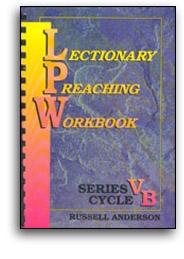SermonStudio
The institution of the covenant meal for both Jews and Christians
Preaching
Lectionary Preaching Workbook
Series V, Cycle B
Theme For The Day: The institution of the covenant meal for both Jews and Christians.
BRIEF COMMENTARY ON THE LESSONS
Lesson 1: Exodus 12:1--4 (5--10) 11--14 (C); Exodus 12:1--8 (11--14) (RC); Exodus 12:1--14a (E)
BRIEF COMMENTARY ON THE LESSONS
Lesson 1: Exodus 12:1--4 (5--10) 11--14 (C); Exodus 12:1--8 (11--14) (RC); Exodus 12:1--14a (E)


